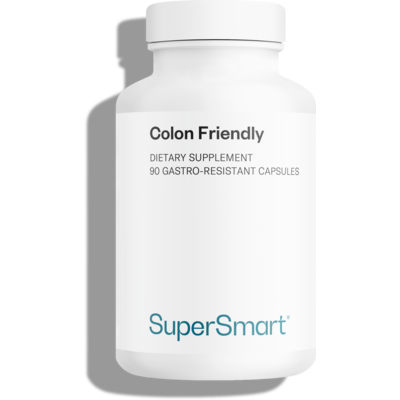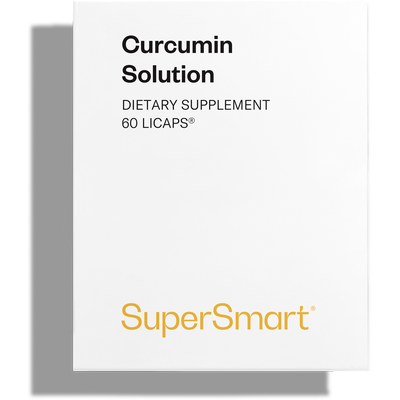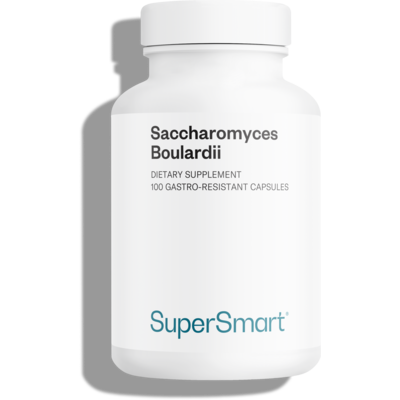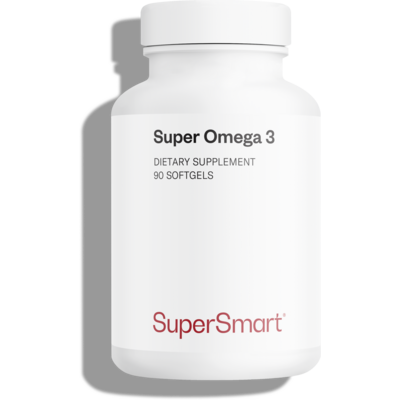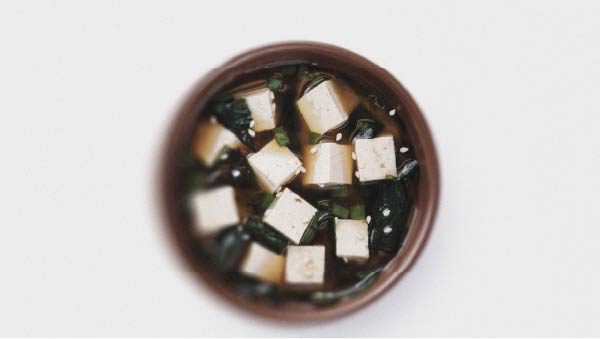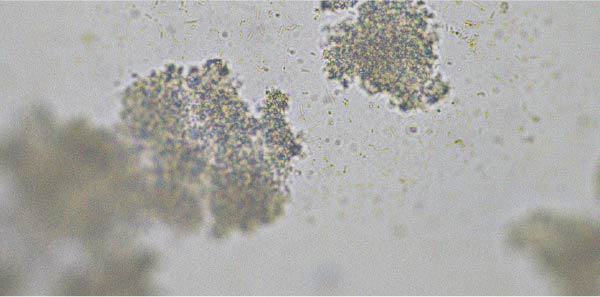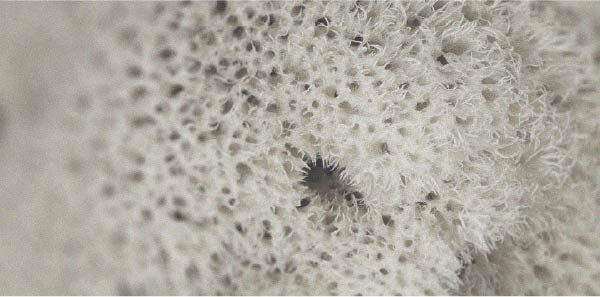Colitis: symptoms, causes & natural treatments
Suffer from pain in your lower abdomen? Think it might be colitis? Read our overview of the typical symptoms, causes and ways of relieving it.

What exactly is colitis?
Colitis is inflammation of the lining of the colon, the part of the gut which goes from the small intestine to the rectum.
It can be acute (occurring suddenly and developing rapidly) or chronic (with persistent effects that usually last more than three months).
It is not a disease as such, but a collection of very varied problems and disorders that lead to inflammation. Provided it is treated quickly, colitis is not usually serious.
Symptoms of colitis
Main symptoms of colon inflammation
Colitis always presents as problems with intestinal transit: diarrhoea or constipation, abdominal pain (which may or may not persist), bloating … (1) Sometimes, it also involves weight loss and fatigue.
On a biological level, there is usually hyperleukocytosis (a raised white blood cell count) and elevated CRP (a marker of inflammation). An endoscopy helps to provide a conclusive diagnosis.
Other symptoms depending on the type of colitis
Additional symptoms may be present depending on the cause of the colitis.
- Infectious colitis: fever and dehydration.
- Antibiotic-induced problems : sometimes bloody diarrhoea and significant pain.
- Radiotherapy-induced problems : blood in stools which may persist for several months after treatment.
- Chronic inflammatory diseases : recurrent blood in stools.
- Irritable bowel syndrome : bloating, gas, problematic digestion, stomach pain.
Persistent diarrhoea can lead to deficiency in certain vitamins due to impaired nutrient absorption and decreased production of vitamins B and K by colon bacterial flora.
What are the potential causes of colitis?
Causes of acute colitis
Acute colitis can be caused by several factors:
- infection by a pathogen: viruses (herpes), bacteria (salmonella, Shigella, yersinia, cholera, staphylococcus, Escherichia coli), fungi (Candida, Histoplasma), parasites (amoeba, trematodes…) It can be the result of food poisoning;
- taking certain medication (usually antibiotics or too many laxatives). This can lead to severe ‘pseudomembranous colitis’;
- poor vascularisation of the colon associated with arterial damage (atherosclerosis) (2): this is referred to as ‘ischaemic colitis’ and is an absolute emergency;
- certain cancer treatments (including radiotherapy of the abdomen and chemotherapy).
Causes of chronic colitis
There are three main causes of chronic colitis:
- irritable bowel syndrome, which results in ‘spasmodic colitis’;
- chronic inflammatory diseases, including Crohn’s disease, during ‘flare-ups’;
- ulcerative colitis, an auto-immune disorder.
Prevention and relief of colitis
Ways of preventing colitis and alleviating its symptoms vary widely depending on the cause:
- to prevent infections, practice good basic hygiene: wash your hands before eating and after going to the toilet, respect food expiry dates, don’t break the cold chain;
- restrict consumption of fatty or spicy foods during episodes of colitis. Avoid coffee, alcohol and fizzy drinks;
- always supplement with probiotics when taking antibiotics (Saccharomyces Boulardii is often recommended in pharmacies);
- the advice to those who suffer from chronic diseases is usually to adopt a special diet, especially during acute phases. Thus in the case of Crohn’s disease, it’s best to avoid dietary fibre (follow the Low-Residue Diet) and irritant foods, in order to minimise the work of the digestive system;
- drink at least 2 litres of water during the day, avoiding large amounts in one go or during a meal;
- split your meals into smaller amounts, without overdoing it, to avoid over-stimulating colon movements, and take care to chew your food thoroughly.
Natural treatments and supplements for colitis
Probiotics and colitis
Several clinical studies (3-4) are looking at the potential benefits of probiotics on the intestinal flora of the colon.
Those containing bifidobacteria and lactobacilli are the most promising (probiotic supplements targeted at the colon, such as Colon Friendly, usually include the best strains).
The probiotic Saccharomyces Boulardii, meanwhile, is the most widely-documented yeast in the case of diarrhoea. Probiotics are found in a number of foods such as kefir, tempeh, miso and yogurt.
Vitamin supplements to compensate for deficiencies
People who suffer from chronic or recurrent colitis are at risk of deficiency in certain vitamins: their gut flora produces fewer vitamins (especially B group vitamins), absorption via the intestinal barrier is less effective and loss of vitamins can be more significant in the case of bloody diarrhoea.
Supplementation with vitamins and minerals may therefore be considered after consultation with a health professional.
Omega-3 and gut flora
Recommended daily amounts of omega-3 fatty acids, found in oily fish, are often far from adequate, yet they do not just support heart and brain health.
They also appear to have a close link with gut flora (5).
It may therefore be worth considering increasing omega-3 intake (preferably via a supplement with excellent digestibility such as Super Oméga-3). It’s important, however, to restrict other fat intake, particularly saturated fats which can lead to ‘fatty diarrhoea’.
Curcumin and inflammation of the gut
Curcumin is a bioactive compound in turmeric which helps to reduce inflammation and support the immune system, of which gut flora is an integral part.
It may be helpful insofar as inflammation of the lining of the colon contributes to dysregulation of the immune system, promoting the selection of pathogenic bacteria over commensal or non-harmful bacteria.
The most bioavailable forms (such as that found in Curcumin Solution) are those most often recommended for colitis.
Taking supplements for colitis: a quick reminder
It goes without saying that all these natural solutions should only be considered under the supervision of a health professional (a gastroenterologist, for example).
SuperSmart ADVICE
References
- Thoeni RF, Cello JP. CT imaging of colitis. Radiology, 2006;240:623—38.
- Balthazar EJ, Yen BC, Gordon RB. Ischemic colitis: CT evaluation of 54 cases. Radiology 1999;211:381—8.
- Huang C, Hao W, Wang X, Zhou R, Lin Q. Probiotics for the treatment of ulcerative colitis: a review of experimental research from 2018 to 2022. Front Microbiol. 2023 Jul 6;14:1211271. doi: 10.3389/fmicb.2023.1211271. PMID: 37485519; PMCID: PMC10358780.
- Roy S, Dhaneshwar S. Role of prebiotics, probiotics, and synbiotics in management of inflammatory bowel disease: Current perspectives. World J Gastroenterol. 2023 Apr 14;29(14):2078-2100. doi: 10.3748/wjg.v29.i14.2078.
Menni, C., Zierer, J., Pallister, T. et al. Omega-3 fatty acids correlate with gut microbiome diversity and production of N-carbamylglutamate in middle aged and elderly women. Sci Rep 7, 11079 (2017). https://doi.org/10.1038/s41598-017-10382-2
5 Days
great products and prices
great products and prices
Marie
11 Days
Easy to navigate site
Easy to navigate site, had what I was searching for, good price. easy order-check out
James Tucker
17 Days
My skin is clearing up nicely!
Pretty good for my skin so far.
Christian
19 Days
The new packaging is excellent
The new packaging is excellent - finally! No more squashed boxes and torn envelopes.
GORAN
20 Days
Great Product
Great Product
Larry Garrett
24 Days
Quick shipping
Quick shipping; good price. No issues!
Mary McCarty
26 Days
Thr product is very good and is helping…
Thr product is very good and is helping me on my health. Then is always on time
LUGO Luz
28 Days
Buying was fine
Buying was fine. I had problems with the website not recognizing my login info, and had to call to get it fixed. Other than that, everything was good.
David S. Clark
29 Days
Your super maca and super ginseng are…phenomenal
Your super maca and super ginseng are phenomenal supplements that compliment each other when taking them together. Fantastic feeling of well-being and lots of mid day energy without the crash.
Keith Mason
31 Days
I have had amazing results with every…
I have had amazing results with every supplement I've purchased. I am extremely satisfied with this company
kirstin Torres
31 Days
Fine products
Fine products . They are on the leading edge of online supplements. The only issue -so far-is they sometime run out of subscription items.
Jason Argos
34 Days
The ordering process is very user…
The ordering process is very user friendly and the products always come in a timely manner.
CARTER Rhonda
35 Days
The price for Dr
The price for Dr. Pero's AC-11 is reasonable and in line with his views. (my former colleague). Keep it pure.
CAMPBELL Clayton
38 Days
Right on every time.
Right on every time.
Arthur Nicholas
41 Days
They are cheaper than everyone else and…
They are cheaper than everyone else and the shipping was fast. Great company.
Patricia Adams


